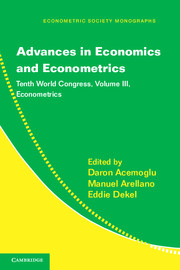Book contents
- Frontmatter
- Contents
- Contributors
- Preface
- I ECONOMETRICS OF INDUSTRIAL ORGANIZATION
- II MACROECONOMETRICS
- III ECONOMETRIC THEORY
- IV EMPIRICAL MICROECONOMICS
- 10 Productivity and Management Practices
- 11 ExtrapoLATE-ing: External Validity and Overidentification in the LATE Framework
- V TIME SERIES AND PANELS
- VI MIRRLEES REVIEW: RETHINKING THE TAX SYSTEM FOR THE TWENTY-FIRST CENTURY
- Name Index
- Miscellaneous Endmatter
11 - ExtrapoLATE-ing: External Validity and Overidentification in the LATE Framework
Published online by Cambridge University Press: 05 May 2013
- Frontmatter
- Contents
- Contributors
- Preface
- I ECONOMETRICS OF INDUSTRIAL ORGANIZATION
- II MACROECONOMETRICS
- III ECONOMETRIC THEORY
- IV EMPIRICAL MICROECONOMICS
- 10 Productivity and Management Practices
- 11 ExtrapoLATE-ing: External Validity and Overidentification in the LATE Framework
- V TIME SERIES AND PANELS
- VI MIRRLEES REVIEW: RETHINKING THE TAX SYSTEM FOR THE TWENTY-FIRST CENTURY
- Name Index
- Miscellaneous Endmatter
Summary
Introduction
Local Average Treatment Effects (LATE) capture the causal effect of an instrument-induced shift in treatment. This effect is necessarily tied to the instrument that generates the shift. The interpretation of instrumental variable (IV) estimates as instrument-specific should not be surprising or troubling – when this point is cast in terms of specific examples, we wonder how it could be otherwise. Quarter-of-birth instruments for a wage equation reveal the payoff to schooling induced by compulsory-attendance laws and not the value of a bought-and-paid-for MBA. Still, a clear statement of the nature of causal effects revealed by any instrument raises questions about the external validity of this estimate. Can we use a given IV estimate to identify the effects induced by another source of variation? What about an unconditional average effect? Can we go from average effects on compliers to average effects on the entire treated population?
The usual answer to these questions is “no.” Except in special cases, we cannot go farther, at least not without additional assumptions. As described by Angrist, Imbens, and Rubin (1996), the treated population includes two groups: (1) compliers whose behavior is affected by the instrument at hand, and (2) always-takers who are treated irrespective of whether a Bernoulli instrument is switched off or on. The nontreated are likewise composed of compliers and never-takers; the latter group avoids treatment no matter what.
- Type
- Chapter
- Information
- Advances in Economics and EconometricsTenth World Congress, pp. 401 - 434Publisher: Cambridge University PressPrint publication year: 2013
- 38
- Cited by



